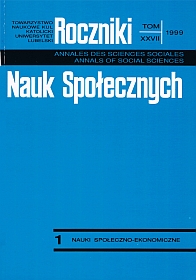Opcja na rzecz ubogich
Abstrakt
In his article the author tries to show the essence, forms and areas of contemporary poverty and to diagnose the state of poverty in Poland. He also presents some psychosocial consequences of poverty and deprivation. Then he characterises the Catholic Church's attitude towards the problem of poverty and he attempts to point to some remedial measures that can be taken by local societies and parish communities. The author demonstrates that basically poverty is a structural problem. Generally people are poor not because they are losers, or because they are not clever enough, or they are unlucky. They are poor because the system, in which society is organised, including the economic system, is just as it is. Poverty has many causes and various consequences. The causes and the consequences are not only related to one another, but they reinforce one another. Struggle against poverty should comprise a possibly broadest range of causes. Social, political and economic changes are necessary, and so is making the policies in the domain of social services more dynamic as well as connecting them with charity work. The possibilities of the Church in the field of charity work are still significant. There is still a need for initiatives on the local scale, comprising a decanate or neighbouring parishes. According to the author, it is advisable that when fulfilling the various tasks or programmes connected with aid all available ways of co-operation with social and state institutions should be used. The experience of recent years shows that such co-operation is possible and often fruitful.
Bibliografia
Danecki J.: Ubóstwo i ubożenie jako kwestia społeczna we współczesnej Polsce. W:Polska bieda. Kryteria. Ocena. Przeciwdziałanie. Red. S. Golinowska. Warszawa 1996.
II Polski Synod Plenarny. Materiały robocze dla parafialnych zespołów synodalnych w roku duszpasterskim 1995/96. Katowice 1995.
Filipiak M.: Problematyka społeczna w Biblii. Warszawa 1985.
GUS. Statystyczny opis jakości życia 1990-1995. Warszawa 1997.
GUS. Ubóstwo w świetle badań budżetów gospodarstw domowych. Warszawa 1996.
JanPaweł II: Orędzie Ojca Świętego na Wielki Post 1998 r. „L'Osservatore Romano” 1998 nr 3.
JanPaweł II: Sollicitudo rei socialis. Città del Vaticano 1987.
Kamiński T.: Parafia wobec problemów społecznych. „Chrześcijanin w Świecie” 1997 nr 2.
Kowalska A.: Problem ubóstwa w gospodarstwach domowych z osobą bezrobotną. W:Polska bieda. Kryteria. Ocena. Przeciwdziałanie. Red. S. Golinowska. Warszawa 1996.
Mariański J.: Etos pracy bezrobotnych. Lublin 1994.
Ograniczyć ubóstwo, tworzyć miejsca pracy, budować solidarność. Szczyt światowy ONZ nt.rozwoju społecznego. Kopenhaga 6-12 marca 1995. „Społeczeństwo” 1995 nr 1.
Rozmowa z Ks. Biskupem Cz. Dominem. „Znaki Czasu” 1987 nr 8/4.
Stadler K.: Niektóre psychospołeczne konsekwencje ubóstwa, biedy i niedostatku. W:Transformacja społeczna w teorii i badaniach socjologicznych. Wybrane zagadnienia. Red. A. Niesporek, S. Nurek. Katowice 1995.
Copyright (c) 1999 Roczniki Nauk Społecznych

Utwór dostępny jest na licencji Creative Commons Uznanie autorstwa – Użycie niekomercyjne – Bez utworów zależnych 4.0 Międzynarodowe.


